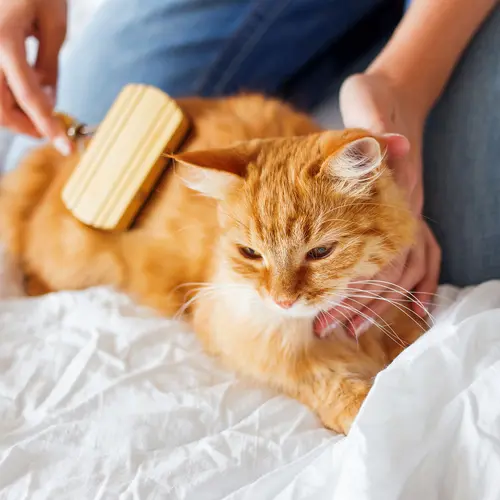You or someone you know probably takes a daily multivitamin. Does your cat need one, too?
“The interest in nutritional supplements for people and pets has exploded into a billion dollar industry over the past several years,” says Bernadine Cruz, DVM, chair of the American Veterinary Medical Association (AVMA) Council on Communications.
Cruz cautions that "anyone, regardless of their expertise, can set up a web site and claim that their product can make your pet feel younger and have increased energy."
Do cat supplements live up to their claims? And, does your cat need supplementation? That partly depends on who you ask.
Are Cat Vitamins and Supplements Necessary?
Cat supplement manufacturers and advocates say such products should be seen as an extension of a cat’s diet, adding that they can help the pets live longer, healthier lives.
Others, including Cruz and members of the Pet Food Institute, say if your cat is generally healthy, a good quality cat food is all that’s needed. Giving your cat more vitamins or minerals could cause more harm than good.
Supplements may be recommended if your cat is sick.
“There are some circumstances where a cat has an underlying condition that may warrant a supplement, but many supplements are untested and unproven in veterinary medicine. The key point is that most cats consuming a complete and balanced diet probably have a better balanced diet than most humans,” says Sherry Sanderson, DVM, PhD, of the University of Georgia College of Veterinary Medicine.
Supplements are meant to correct deficiencies.
For example, your cat may need a supplement if they have a medical condition that makes them unable to absorb a particular nutrient. Small intestinal disease can cause an inability to absorb the B vitamins folate and cobalamine. In this case, the cat would require injections of those two supplements, as oral supplements won’t be absorbed either.
Cats that are pregnant and nursing may develop nutritional deficiencies that require supplementation, particularly if the cat becomes pregnant before age 10-12 months, Cruz says. Your vet can direct you to the appropriate product.
Types of Cat Supplements
- General vitamins and minerals: A variety of single or multivitamin products are available for cats. Most cat foods contain all the necessary vitamins and minerals that a cat needs.
- Essential fatty acids: Omega-3 fatty acids and omega-6 fatty acids are touted for their ability to keep a cat’s coat shiny and to prevent shedding. They also protect a cat’s immune system, liver, eyes, brain, and joints. And, just like in humans, omega-3 fatty acids boost heart health and fight high cholesterol. Cat foods contain a lot more omega6 fatty acids than omega-3 fatty acids, so some think supplementation is needed. But not everyone is sold on the idea.
- Probiotics: Probiotics are healthy, “good” bacteria that help improve digestive health. They contain microorganisms such as Lactobacillus acidophilus or Lactobacillus casei (also found in some yogurts), which control the overgrowth of "bad" bacteria in the large intestine.
Cat Supplements vs. Nutraceuticals
Nutraceuticals are herbal or natural remedies that fall in a bit of a gray area where supplements are concerned. Advocates for pet nutraceuticals say such products simply supplement the cat’s natural diet. They’ve referred to them as “more than feed additives but less than pharmaceuticals."
But the Pet Food Institute’s Nancy Cook says “nutraceuticals are intended to treat or prevent a disease and are therefore a drug, not a supplement.” The AVMA defines nutraceutical medicine as “the use of micronutrients, macronutrients, and other nutritional supplements as therapeutic agents.”
“It is necessary for the consumer to be aware that natural does not always mean safe or effective,” Cruz says.
Types of Nutraceuticals
Nutraceutical products are found in the supplement section in pet stores and online. Some of the top sellers for cats are:
- Glucosamine helps increase joint mobility and is often touted as a treatment for arthritis, although Cruz says it doesn't relieve its pain.
- Chondroitin is also for healthy bone and joints. It is often found with glucosamine.
- Milk thistle extract helps remove toxins from the cat’s liver. It may be used for cats with liver disease.
Cat Supplements to Avoid
Experts say there are a lot of unsafe supplements, but the biggest ones to avoid include:
- Garlic: destroys red blood cells, leading to anemia
- Onion: destroys red blood cells, leading to anemia
- Calcium: too much can be toxic
- Vitamin D: too much can be toxic
- Vitamin C: too much can cause overly acidic urine, which can lead to crystal formation and a lifethreatening blockage
Where to Buy Cat Supplements
Before buying a supplement, ask your veterinarian which kind, if any, is best suited for your cat’s life stage and medical condition.
“It is best to keep your vet in the loop on any supplements you are thinking about giving to your cats,” Sanderson says. She recommends asking your vet about a reputable seller of cat supplements, adding that she would not buy them online unless she had confidence in the company selling them.
Cruz says, “Don’t believe everything that you read on the [Internet].” Cruz says she has seen some great nutritional breakthroughs in the past 20 years, but she’s also seen an abundance of fad supplements.
More Is Not Always Better
It's important to remember that you can harm your cat by giving them too many supplements.
Cats of different ages and lifestyles have very different dietary needs. Do not use different supplements together, as they may contain the same or similar ingredients.
Always talk to your vet before giving your cat any type of supplements. “Over-supplementation can have ill side effects,” Cruz says. “Remember, more is not always better.”

